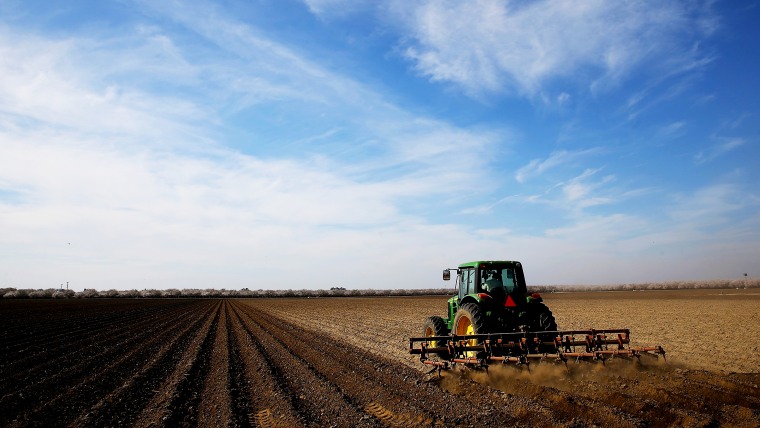Last week, the White House's Peter Navarro, one of the principal architects of Donald Trump's trade war, appeared on CNN and boasted, "Farmers are doing great." The host noted the many struggling farmers who'd "take issue with that statement," especially in light of the sharp increase in farm bankruptcies.
But the president's aide was undeterred, pointing to assorted trade deals the White House has tackled. "They're happy," Navarro concluded, in reference to American farmers.
The reality, which Team Trump has been reluctant to acknowledge, is that farmers are not "doing great." In fact, if they were, it wouldn't have been necessary for the president to approve multiple bailouts for the industry -- the price tags for which are already more than double the size of the 2009 auto-industry rescue.
And yet, the pain persists. The Washington Post ran a profile piece yesterday of a family in central New York that's struggling mightily to get by.
When Anne and her husband, Andy, took over his parents' 305-acre dairy farm in 2013, they made a good living. But years of falling milk prices, complicated by President Trump's trade wars, have left the couple nearly $200,000 in debt.Farmers around the country are struggling to pay for basics like groceries and electricity as farm bankruptcies rise and farm debt hits a record high. Calls from farmers in financial crisis to state mediators have soared by 57 percent since 2015."We're supposed to be feeding the world, and we can't even put food on our own table," Anne said.
The featured family recently found it necessary to turn to the Supplemental Nutrition Assistance Program, commonly known as food stamps, to get by. (The Trump administration recently announced plans to limit access to food assistance, cutting off nearly 700,000 of the nation's poorest people.)
The family's story is a familiar one. Brian Thalmann, president of the Minnesota Corn Growers Association, recently challenged Trump's assertion that farmers are doing "great" again.
"We are not starting to do great again," Thalmann told Agriculture Secretary Sonny Perdue in August. "We are starting to go down very quickly."
As we discussed soon after, what's striking is not just that so many farmers are making their concerns known, but also that the president has convinced himself that these concerns don't really exist.
As recently as May, the president said he’d “never heard … any of the farmers speak badly” about his trade agenda. Soon after, a reporter told Trump about a conversation with a soybean farmer who said the administration’s tariffs had created a “crisis” for his business.
“Well,’ Trump replied, “you interviewed the wrong farmer.”
The Republican’s perspective appears to be shaped by political perceptions: the president knows he won overwhelming victories in rural areas, which leads him to assume farmers are on his side, which also leads him to assume farmers don’t mind paying the price for his trade war.
Indeed, Trump has been rather explicit on this point, conceding last year that his plan would cause “pain” for some farmers, but adding that he assumed they were willing to take one for the team. “I tell you, our farmers are great patriots. These are great patriots,” the president said last spring. “They understand that they’re doing this for the country.”
In context, “this” seemed to refer to putting their livelihoods on the line as the amateur president pursues a trade war he doesn’t fully understand and hasn’t fully thought through.
Complicating matters, Trump's assumption may very well be correct. The Washington Post had a report in October on "farm-state fury" over the White House's agenda and its effects on the agricultural industry, which noted, "Many of those grumbling about Trump today concede they are unlikely to vote for a Democratic presidential candidate next year."
Indeed, the struggling family in central New York, profiled in the Post yesterday, defended Trump, confident that he's looking out for their interests.
The president gambled that these farming communities wouldn't turn on him, even as they felt the brunt of his plan. There's reason to believe the political calculus will work in his favor.
